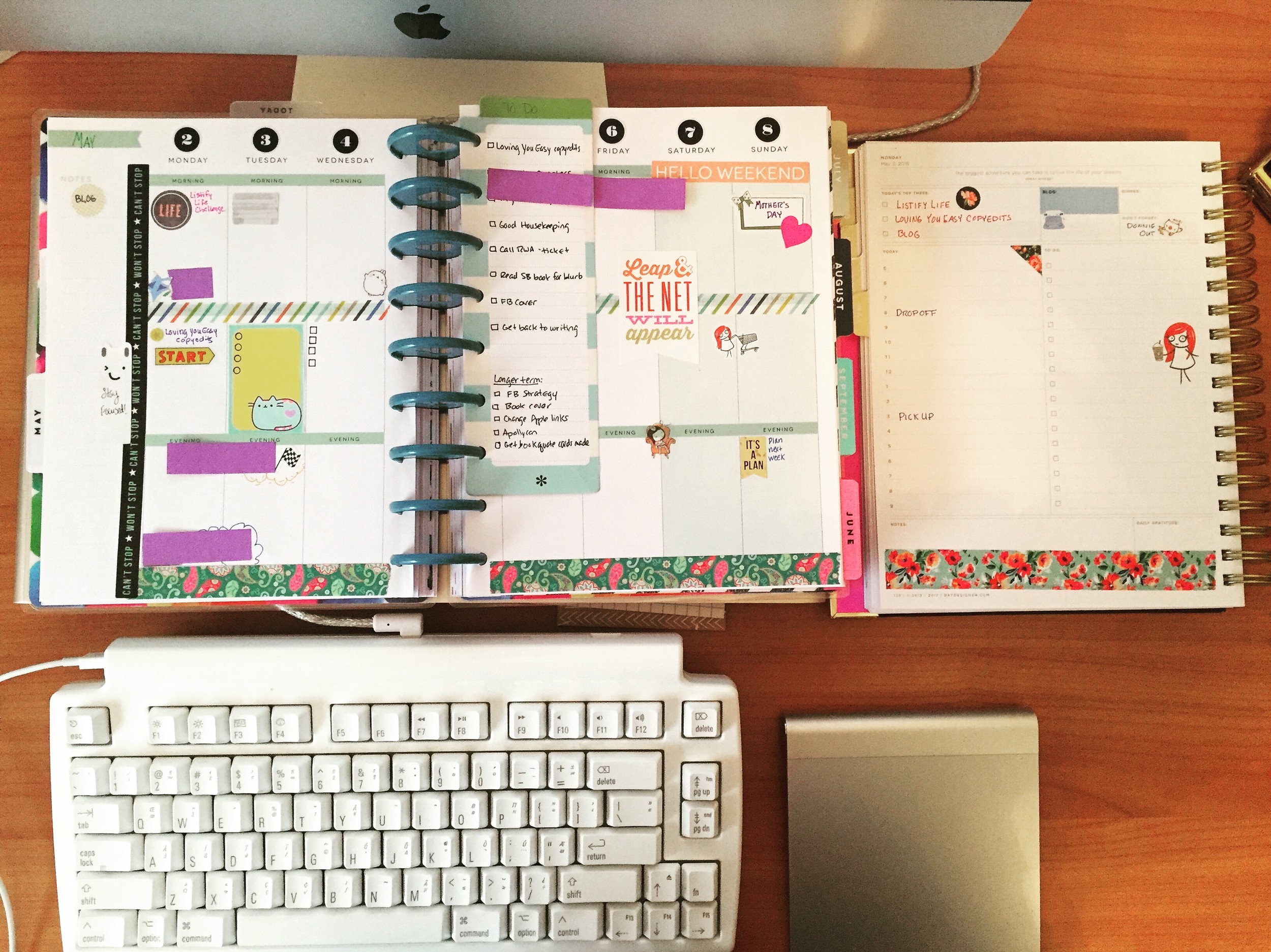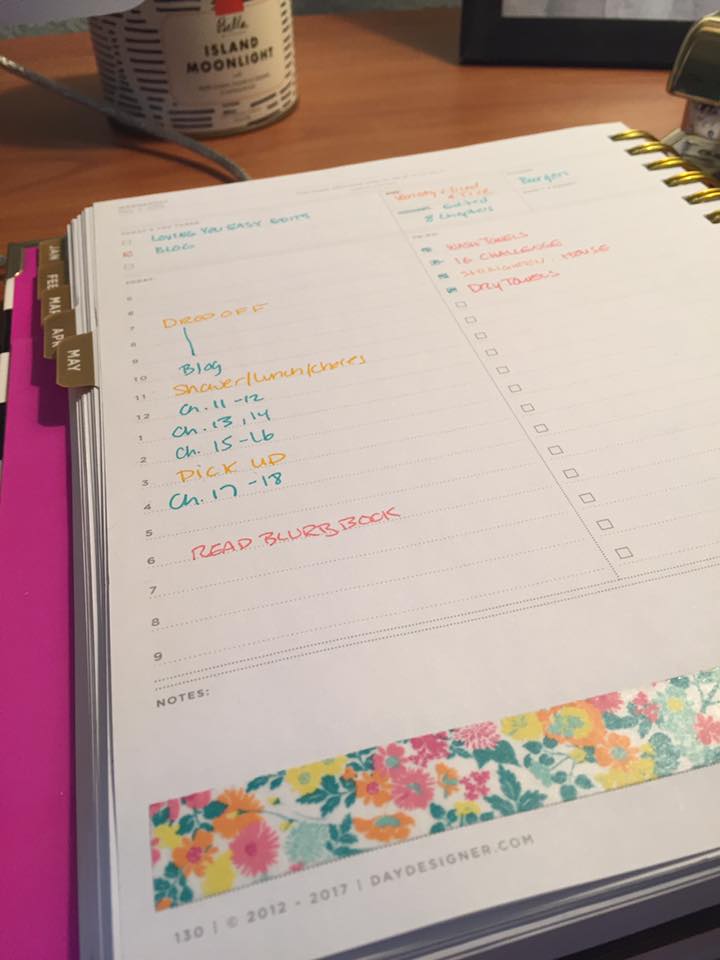I talk a lot about To Do lists and planning here, but there's another part to productivity that I've never paid that much attention to: tracking the actual time I spend doing things. I add things to my schedule, but how often do I stick to that? Not very often unless it's a set appointment. So if I get to the end of the day and haven't checked off all of my To Dos, what's the reason? Did I screw around and waste time? Did I schedule too much? Were my goals unrealistic? I didn't know.
So, this week I decided to track my time. I'm currently using a two-planner system since I've found I need both a weekly overview and a daily tasks list to keep me focused. The Happy Planner houses my weekly events/appointments and I get that planned out on Sunday. But then I'm using my Day Designer each morning to write out a fresh To Do list. But the Day Designer also has a column for your schedule. I decided to try to use that to track my time as I get things done vs. pre-planning anything in that section. It's turned out to be SO helpful, so I thought I'd share my thoughts with y'all. Here's some of what I've discovered...
The Benefits of Tracking Your Time
1. Know how long it takes you to do something.
Often we underestimate how long something is going to take us to do. Tracking time gives you hard numbers about how long something takes. So instead of assuming, "Oh, I need to blog and that will only take 20 minutes.", you'll find out that it is actually taking up an hour of your morning.
For instance, this week I'm doing fine-toothed-comb editing on LOVING YOU EASY. That means that I have to read EVERY word. This is the stage where I catch typos or awkward sentences or little logic mistakes. So it's pretty intensive. And I've discovered by tracking my time that I consistently take 30 minutes to get through one chapter. That's very helpful for me to know because now I can look forward and know how long it's going to take me to wrap up these edits.
2. Learn your peak productive hours.
We all have them and they are going to vary from person to person. Like I hear that some writers get up at 4 or 5am to write before everyone gets up. That would never work for me. My brain isn't creative at that time. *not a morning person* This week, I've learned that I'm not productive until about 10am. No matter how motivated I am, my la-la-la, ooh-bright-and-shiny-distracted time is between 8:30 and 10am. This is the time I check all my social media accounts, chat with friends, read interesting articles from Twitter, etc.
My guess is that this segment of time is how long it takes for my morning coffee to kick in, lol. But I'm learning that I have to ease into my work day. My highest productivity is after lunch. I know this to be true when I'm drafting too. I don't get into my writing flow until afternoon. It is what it is.
3. Helps you tailor your work day
So building on the point above, if you have a pattern of when you're productive, when you're creative, when you need mindless things, you can structure your day to play to those. This may be harder if you have a schedule at work that's out of your control. But if you're able to, you can schedule the things that require less mental intensity at times when you have the most trouble concentrating. So for me that means I should probably schedule low intensity things in the morning when I know I'll be less likely to be writing/editing. Social media updates, responding to comments, answering email, etc. It's all good information to have to make the best use of your time.
4. Keeps you honest about wasting time and gives you options for when best to do it.
We all waste time. That's not a bad thing. We need fun and mental breaks too. But if you track your time, you can find out if you're doing that a little too much. You can pinpoint what sucks up your time, what sends you down a rabbit hole. And if you need it, you can use apps to shut down your access to the internet and have focused times to work on what you need to work on. I talked more about that in this post. And you can even schedule in a time to do those not so productive things. That can help because you know--ooh, I want to read this article, respond to this FB thing, etc. but I can save it and do that at x time when I have break time scheduled.
5. It's motivating and reinforcing to write down what you've done as you go.
Don't wait until the end of the day to write everything down. You'll forget and it won't be accurate. Write down what you did each hour as you do it. Keep a notepad or planner nearby so it's easy to jot down. I find it's hard to write down "wasted a whole bunch of time" lol. I'd much rather write down. "Two chapters edited!" That's reinforcing. :)
Ready to give it a shot?
You don't need two planners like I have. Though you can! If you just want to try it out for a few days, use a notebook or find a printable. The Day Designer has free printables of the schedule I'm using. So grab one of those if you want something with the times already on it. And let me know if you try and how it goes! :)
Does anyone already track their time or have you tried this experiment in the past?
*Day Designer link is an affiliate link.


